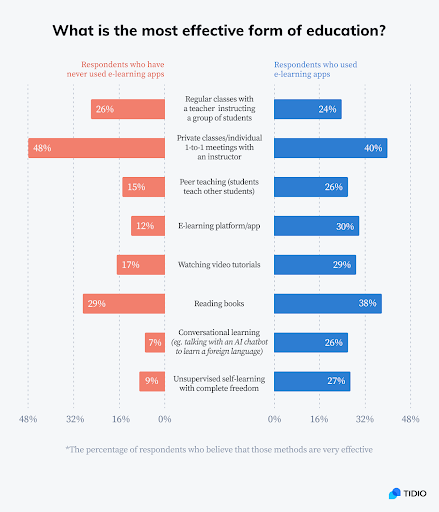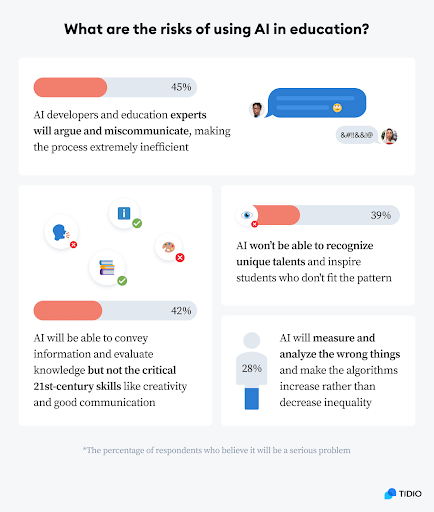With technology expanding day by day, the world of education is also starting to be influenced. This was exhibited largely in the last year with most of the learning being moved online. AI and robots have become a big part in our everyday lives.
Technology has been branded with quite a few expectations in the educational field which includes a belief for it to grow at average annual growth rate of 20 percent. Before the end of this decade the educational technology market will most likely reach 500 billion US dollars. Having a good insight on the needs and wants of the educational sector will prove vital for the tech companies.
The stats from a survey conducted by Tidio show that 67% of people who responded think that hybrid learning with long distance learning is the way forward. The majority of the respondents think that long-distance learning will for sure stay with us even after the corona-virus pandemic ends. 67% view this as an opportunity while66% believe that everyone should be given the choice to either stay at home or attend in-person classes.
But, as all great things have problems, so does remote learning. One of its biggest problems is anxiety; depression and many other mental health issues caused by long-distance learning and are the biggest challenges for education. Mental health issues are currently the leading challenges that schools have to face due to social distancing. This fact was further confirmed by 1 out of 3 respondents to the survey. This went on to clearly show that online learning has yet to embody the social role of a school environment.
64% of the respondents think that robots can take the place of teachers in the near future. This was backed by 2 out of 3 respondents who think that robots will be able to replace human teachers but the other 39% harbor fears that the robots will not be able to recognize the unique talent in the students and motivate them. There is also a fear that robots may not be able to replicate two of the best qualities of even the greatest teachers which are empathy and good listening skills.
Even though education is becoming more rapidly accessible, quality is also decreasing and that is the belief of 74%of people. New technologies have a wider access to education making most people be in favor of it. But at the same time 64% said that they have doubts about the quality of education. There is also a belief that modern schools do not equip children with a skillset that includes the right and most important skills.
The most important skills which were mentioned above are good communication and social skills which remote learning cannot provide. Most respondents think that social skills are 25% more important than programming ones. Good communication skills were voted more desirable than math or any foreign language.
According to 25%of respondents Google is the best candidate to be given the task of making AI powered teaching solutions. But after a separate poll for robot enthusiasts it was suggested that an open-source standard that can be accessed by everyone for free would be an enhanced resolution.
Technology offers a wider and more immediate form of knowledge to students and a variation in the forms of learning. With this everybody can have access to education. The survey results show that the people who frequently make use of e-learning apps have more faith in the usefulness and effectiveness of these applications.
Everything mentioned above leaves us with one final question “will the impact of AI on education take us in a positive or negative direction?”; Well that depend on a few factors.
AI will certainly help in a few things like grading, planning or marking attendance but we cannot expect it to take over the traditional classroom based learning that has been going on for decades. The true education of children lies in social and communicational learning which AI can’t provide.
Read next: Can You Get a College Level Education Online? It Might Be Easier Than You Think
Technology has been branded with quite a few expectations in the educational field which includes a belief for it to grow at average annual growth rate of 20 percent. Before the end of this decade the educational technology market will most likely reach 500 billion US dollars. Having a good insight on the needs and wants of the educational sector will prove vital for the tech companies.
The stats from a survey conducted by Tidio show that 67% of people who responded think that hybrid learning with long distance learning is the way forward. The majority of the respondents think that long-distance learning will for sure stay with us even after the corona-virus pandemic ends. 67% view this as an opportunity while66% believe that everyone should be given the choice to either stay at home or attend in-person classes.
But, as all great things have problems, so does remote learning. One of its biggest problems is anxiety; depression and many other mental health issues caused by long-distance learning and are the biggest challenges for education. Mental health issues are currently the leading challenges that schools have to face due to social distancing. This fact was further confirmed by 1 out of 3 respondents to the survey. This went on to clearly show that online learning has yet to embody the social role of a school environment.
64% of the respondents think that robots can take the place of teachers in the near future. This was backed by 2 out of 3 respondents who think that robots will be able to replace human teachers but the other 39% harbor fears that the robots will not be able to recognize the unique talent in the students and motivate them. There is also a fear that robots may not be able to replicate two of the best qualities of even the greatest teachers which are empathy and good listening skills.
Even though education is becoming more rapidly accessible, quality is also decreasing and that is the belief of 74%of people. New technologies have a wider access to education making most people be in favor of it. But at the same time 64% said that they have doubts about the quality of education. There is also a belief that modern schools do not equip children with a skillset that includes the right and most important skills.
The most important skills which were mentioned above are good communication and social skills which remote learning cannot provide. Most respondents think that social skills are 25% more important than programming ones. Good communication skills were voted more desirable than math or any foreign language.
According to 25%of respondents Google is the best candidate to be given the task of making AI powered teaching solutions. But after a separate poll for robot enthusiasts it was suggested that an open-source standard that can be accessed by everyone for free would be an enhanced resolution.
Technology offers a wider and more immediate form of knowledge to students and a variation in the forms of learning. With this everybody can have access to education. The survey results show that the people who frequently make use of e-learning apps have more faith in the usefulness and effectiveness of these applications.
Everything mentioned above leaves us with one final question “will the impact of AI on education take us in a positive or negative direction?”; Well that depend on a few factors.
AI will certainly help in a few things like grading, planning or marking attendance but we cannot expect it to take over the traditional classroom based learning that has been going on for decades. The true education of children lies in social and communicational learning which AI can’t provide.
Read next: Can You Get a College Level Education Online? It Might Be Easier Than You Think







